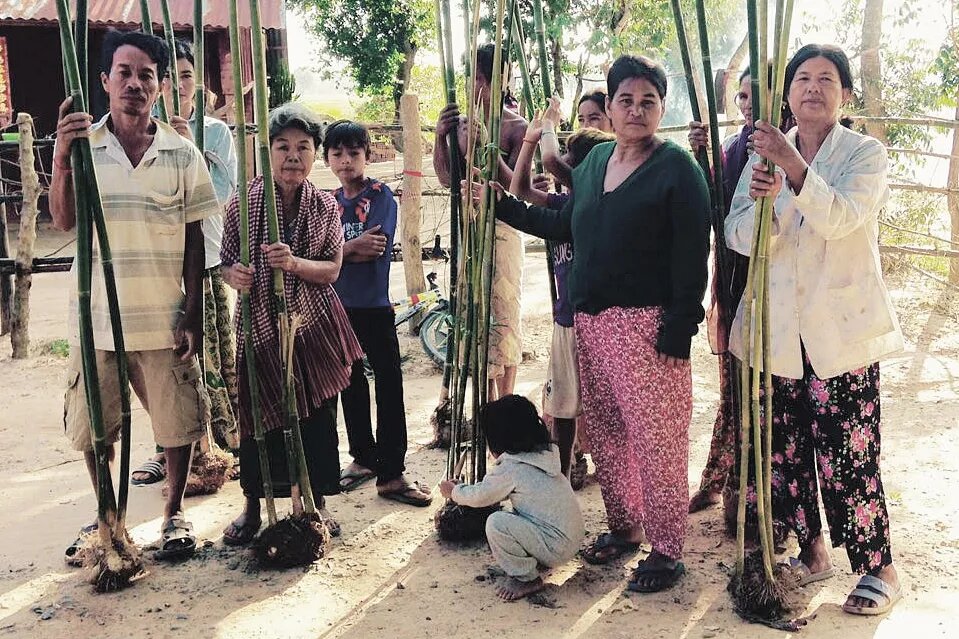Interview with Tessa Polder, founder of ‘Suck On That’, a Cambodian bamboo straw social enterprise

The first question that popped into my mind: why straws?
For quite some time, my frustration with plastic and wasteful habits had been building up but the tipping point was when I was in Koh Rong. I was walking down the beach and there were so many plastic straws lying around, it just made me very sad that we were destroying such a beautiful place. Various alternatives to plastic straws exist so I thought I would start encouraging people to start using the most sustainable alternative, which is a bamboo straw.
What is the advantage of using bamboo over plastic straws?
From a health point of view, for the consumer it is a lot better to use bamboo straws because they are completely natural and organic. Whereas when you use a plastic straw you end up consuming some of the chemical toxins, which has negative impacts on your health. From an environmental stance, bamboo is also much better. Bamboo doesn’t require any high-energy processes to make and they are completely biodegradable. A plastic straw, on the other hand, takes 200 years to break down into small pieces and it never completely disappears.
How often can the bamboo straw be reused?
It depends on how well you look after your straw but at least 50 times. If you have your own individual straw you can use it for years but of course in a restaurant the case is different.
How do you look after your straw, is there a special way to clean them?
Bamboo is actually a naturally bacterial free material so that helps. However, you can put them into the dishwasher but you can also just use hot water and a little bit of soap or for people that want to avoid using liquid detergents, they can use vinegar and hot water as that will kill the bacteria.
You mentioned that your bamboo straw is a Fair Trade straw
It is the first and only Fair Trade straw in the world so that means that I ensure that the straws are made according to all the 10 WFTO (World Fair Trade Organization) Fair Trade principles. Suck On That is partnering with two WFTO Guaranteed Members to not only have a positive environmental impact but also a positive social impact. That is why we are working with rural villages in Cambodia; we are trying to create jobs for communities, which otherwise would have very little job opportunities.
How many communities do you work with at this point?
At the moment the producers are a small group of women in Takeo province. I only started this six months ago so it is still very small-scale but I also began planting bamboo in a very rural and disadvantaged community an hour away from the current producers. The community is interested in trying to find other economy opportunities to support themselves. As the bamboo will take around 2-3 years to grow we can only start the bamboo production in that community in a few years.
Why is it so important for a country like Cambodia to reduce its plastic waste and its use of plastic straws?
I think it is important on a global scale to reduce plastic waste because obviously plastic is an issue that transcends borders. It is not just Cambodia but Cambodia needs to address this issue, as there is very little awareness and a lot of plastic waste. Also, their waste management system is very rudimentary - most of the waste is gotten rid of through burning, which is detrimental because it releases a lot of toxic fumes and pollutants.
To create awareness in Cambodia, I think it is important we start educating children at a young age, teach them about it at school and then when the kids go home they can hopefully tell their parents so they can then learn through the kids.
Is bamboo a realistic alternative for a small local business?
Bamboo straws are slightly more expensive than plastic straws so I understand that not all businesses can afford to make the switch. However, it is also an option for them to go entirely ‘straw-less’ or to only serve a straw on request. Sometimes I see drinks served with two straws – it is this kind of wasteful habit that needs to change. If we can drink a beer or glass of wine without a straw we can also drink other drinks without a straw.
Since the present situation needs desperate changing - what is your vision of Cambodia in 2025?
Ideally, I would like to see more policies forcing businesses to be more sustainable. I hope people will start becoming a bit more aware since it is already such a big problem that needs to be addressed seriously.
Join our Event: Plastic Free Cambodia & Cloud Flea Market to mark International Straw Free Day, from 3-8pm at Cloud (Street 9), Link: https://www.facebook.com/events/167859057307913
Contact
Email: info@suckonthat.com
Website: http://www.suckonthat.com
Facebook: https://www.facebook.com/suck.on.that
Instagram: https://www.instagram.com/suck.on.that



